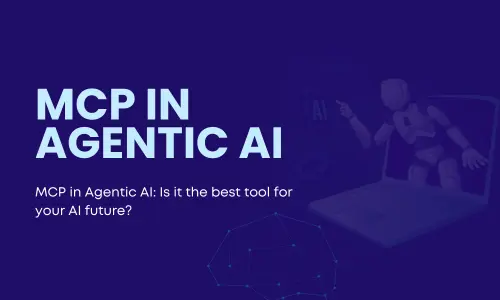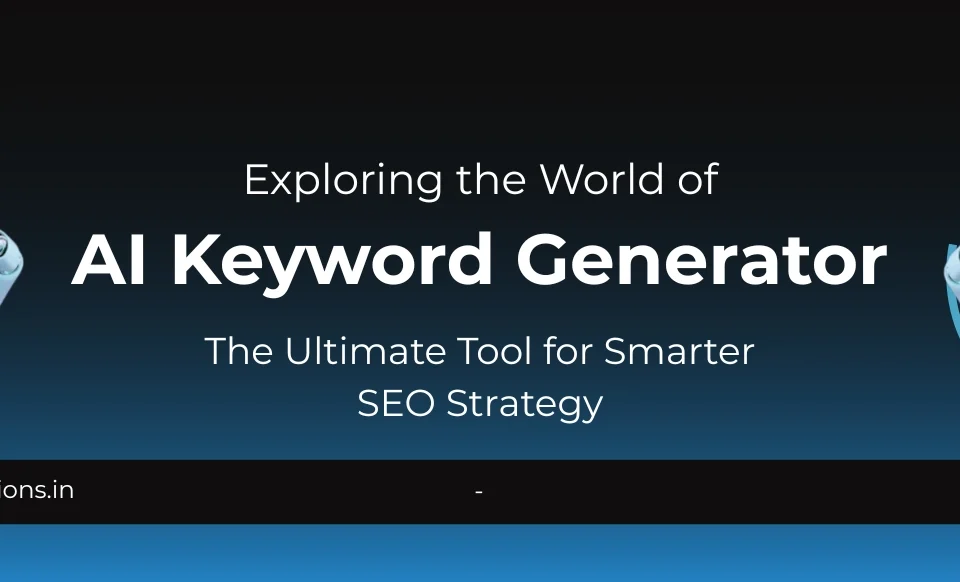MCP in Agentic AI: Is it the best tool for your AI future?

Perplexity Launches Comet: AI-Driven Browser for Smart Interaction
July 24, 2025
Google Trends API (alpha) Launching | A New Era in Search Data Access
July 26, 2025The world of artificial intelligence is evolving rapidly, and tools like MCP (Multi-Agent Coordination Platform) are at the forefront of this transformation. As businesses and developers seek innovative ways to harness AI’s potential, agentic AI—systems capable of autonomous decision-making and task execution—is gaining significant attention. But is MCP the ultimate solution for navigating this dynamic landscape? This article dives deep into what MCP offers, its role in agentic AI, and whether it’s the right tool to shape your AI-driven future.
Understanding Agentic AI and Its Importance
Agentic AI refers to intelligent systems that can independently make decisions, adapt to changing environments, and execute tasks with minimal human intervention. These systems are designed to mimic human-like reasoning, enabling them to handle complex workflows, collaborate with other AI agents, and solve problems efficiently.
Why Agentic AI Matters for Businesses
The rise of agentic AI is reshaping industries by automating processes that once required extensive human oversight. From supply chain optimization to customer service automation, these systems are enhancing efficiency and reducing costs. By leveraging platforms like MCP, businesses can coordinate multiple AI agents to work seamlessly, ensuring smoother operations and better outcomes.
The Role of Coordination in AI Systems
Coordination is the backbone of agentic AI. Without a robust framework to manage interactions between AI agents, tasks can become fragmented, leading to inefficiencies. This is where MCP steps in, providing a structured environment for AI agents to communicate, share data, and execute tasks collaboratively.
What is MCP and How Does It Work?
MCP, or Multi-Agent Coordination Platform, is a tool designed to facilitate the interaction and collaboration of multiple AI agents. It acts as a central hub, enabling agents to share information, align their actions, and work toward common goals. By streamlining communication, MCP ensures that AI systems operate cohesively, even in complex, multi-agent environments.
Core Features of MCP
MCP offers a range of features that make it a compelling choice for developers and businesses:
- Seamless Agent Integration: MCP allows multiple AI agents to connect and function as a unified system, regardless of their underlying architectures.
- Real-Time Coordination: The platform supports real-time communication, enabling agents to adapt to dynamic conditions.
- Scalability: MCP is built to handle both small-scale projects and enterprise-level applications, making it versatile for various use cases.
- Customizable Workflows: Users can define specific tasks and workflows, tailoring the platform to their unique needs.
How MCP Enhances Agentic AI
By providing a framework for AI agents to collaborate, MCP enhances the efficiency and effectiveness of agentic AI systems. It eliminates bottlenecks, reduces redundancies, and ensures that tasks are executed in a coordinated manner. For example, in a logistics operation, MCP can synchronize AI agents managing inventory, delivery schedules, and customer communications, resulting in a streamlined process.
Benefits of Using MCP in Agentic AI
Adopting MCP for agentic AI projects comes with several advantages that can position businesses for success in an AI-driven world.
Improved Efficiency and Productivity
MCP’s ability to coordinate multiple agents ensures that tasks are completed faster and with greater accuracy. By automating repetitive processes and enabling real-time decision-making, businesses can focus on strategic priorities while MCP handles the operational details.
Enhanced Scalability for Growing Needs
As businesses expand, their AI systems must scale to meet increasing demands. MCP’s flexible architecture allows organizations to add more agents or integrate new functionalities without overhauling their existing systems.
Cost-Effective AI Implementation
Implementing AI solutions can be costly, but MCP’s streamlined approach reduces development time and resource requirements. By providing a ready-to-use coordination platform, it lowers the barrier to entry for businesses looking to adopt agentic AI.
Challenges and Limitations of MCP
While MCP offers significant benefits, it’s not without its challenges. Understanding these limitations is crucial for determining whether it’s the right tool for your AI future.
Learning Curve for New Users
For teams unfamiliar with multi-agent systems, MCP can present a steep learning curve. Proper training and onboarding are essential to maximize its potential and avoid implementation pitfalls.
Dependency on System Integration
MCP’s effectiveness relies on seamless integration with existing AI agents and systems. If your organization uses proprietary or incompatible technologies, additional development work may be required to ensure compatibility.
Potential for Overcomplexity
In highly complex environments with numerous agents, managing workflows on MCP can become challenging. Without careful planning, the platform’s flexibility can lead to overly intricate systems that are difficult to maintain.
Comparing MCP to Other Agentic AI Tools
To determine whether MCP is the best tool for your AI future, it’s worth comparing it to other platforms in the market.
MCP vs. Traditional AI Frameworks
Unlike traditional AI frameworks that focus on individual models, MCP emphasizes multi-agent coordination. This makes it better suited for applications requiring collaboration between multiple AI systems, such as autonomous vehicle fleets or smart city infrastructure.
MCP vs. Open-Source Alternatives
Open-source platforms like ROS (Robot Operating System) offer similar coordination capabilities but may lack the scalability and user-friendly interface of MCP. However, open-source tools provide greater flexibility for developers who prefer custom solutions.
MCP vs. Enterprise AI Platforms
Enterprise-grade platforms like IBM Watson or Google Cloud AI offer robust AI capabilities but often come with higher costs and complexity. MCP strikes a balance by providing enterprise-level coordination at a more accessible price point.
Use Cases for MCP in Agentic AI
MCP’s versatility makes it applicable across a wide range of industries and scenarios. Here are a few examples of how it can be used:
Supply Chain Optimization
In logistics, MCP can coordinate AI agents managing inventory, transportation, and demand forecasting. This ensures that goods are delivered efficiently, minimizing delays and costs.
Customer Service Automation
MCP can integrate chatbots, recommendation engines, and data analytics agents to provide personalized customer experiences. By coordinating these agents, businesses can deliver faster, more accurate responses to customer inquiries.
Smart Manufacturing
In manufacturing, MCP can oversee AI agents controlling robotic arms, quality control systems, and predictive maintenance tools. This results in a more efficient production line with reduced downtime.
Is MCP the Right Choice for Your AI Future?
Deciding whether MCP is the best tool for your AI initiatives depends on your organization’s goals, technical capabilities, and resources.
When to Choose MCP
MCP is ideal for businesses or developers who:
- Need to coordinate multiple AI agents for complex tasks.
- Want a scalable, user-friendly platform to streamline AI operations.
- Are looking for a cost-effective solution to implement agentic AI.
When to Explore Alternatives
If your project involves a single AI model or requires highly customized solutions, other platforms or bespoke development may be more appropriate. Additionally, organizations with limited technical expertise may need to invest in training before adopting MCP.
Getting Started with MCP
Ready to explore MCP for your agentic AI projects? Here’s how to get started:
- Assess Your Needs: Identify the specific tasks and workflows you want to automate using agentic AI.
- Evaluate Compatibility: Ensure your existing AI systems can integrate with MCP or plan for necessary adjustments.
- Start Small: Begin with a pilot project to test MCP’s capabilities before scaling to larger applications.
- Leverage Support Resources: Take advantage of MCP’s documentation, tutorials, and community forums to accelerate your learning curve.
The Future of MCP in Agentic AI
As AI continues to advance, platforms like MCP will play a critical role in enabling seamless collaboration between intelligent agents. With ongoing improvements in scalability, user experience, and integration capabilities, MCP is well-positioned to remain a key player in the agentic AI space. By staying ahead of industry trends and addressing user feedback, MCP has the potential to become a cornerstone of AI-driven innovation.
MCP offers a powerful solution for businesses and developers looking to harness the potential of agentic AI. Its ability to coordinate multiple AI agents, streamline workflows, and scale with growing needs makes it a compelling choice for a wide range of applications. However, its learning curve and dependency on system integration require careful consideration. By weighing its benefits against its limitations and comparing it to other tools, you can determine whether MCP is the key to unlocking your AI-driven future.


